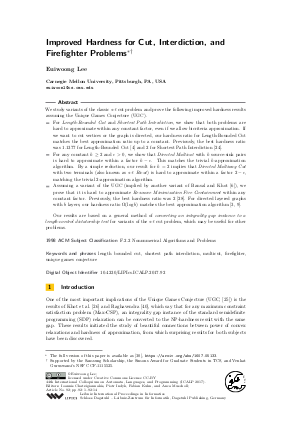Improved Hardness for Cut, Interdiction, and Firefighter Problems
Author Euiwoong Lee
-
Part of:
Volume:
44th International Colloquium on Automata, Languages, and Programming (ICALP 2017)
Part of: Series: Leibniz International Proceedings in Informatics (LIPIcs)
Part of: Conference: International Colloquium on Automata, Languages, and Programming (ICALP) - License:
 Creative Commons Attribution 3.0 Unported license
Creative Commons Attribution 3.0 Unported license
- Publication Date: 2017-07-07
File

PDF
LIPIcs.ICALP.2017.92.pdf
- Filesize: 0.54 MB
- 14 pages
Document Identifiers
Subject Classification
Keywords
- length bounded cut
- shortest path interdiction
- multicut; firefighter
- unique games conjecture
Metrics
- Access Statistics
-
Total Accesses (updated on a weekly basis)
0Document
0Metadata
Abstract
We study variants of the classic s-t cut problem and prove the following improved hardness results assuming the Unique Games Conjecture (UGC). * For Length-Bounded Cut and Shortest Path Interdiction, we show that both problems are hard to approximate within any constant factor, even if we allow bicriteria approximation. If we want to cut vertices or the graph is directed, our hardness ratio for Length-Bounded Cut matches the best approximation ratio up to a constant. Previously, the best hardness ratio was 1.1377 for Length-Bounded Cut and 2 for Shortest Path Interdiction. * For any constant k >= 2 and epsilon > 0, we show that Directed Multicut with k source-sink pairs is hard to approximate within a factor k - epsilon. This matches the trivial k-approximation algorithm. By a simple reduction, our result for k = 2 implies that Directed Multiway Cut with two terminals (also known as s-t Bicut} is hard to approximate within a factor 2 - epsilon, matching the trivial 2-approximation algorithm. * Assuming a variant of the UGC (implied by another variant of Bansal and Khot), we prove that it is hard to approximate Resource Minimization Fire Containment within any constant factor. Previously, the best hardness ratio was 2. For directed layered graphs with b layers, our hardness ratio Omega(log b) matches the best approximation algorithm. Our results are based on a general method of converting an integrality gap instance to a length-control dictatorship test for variants of the s-t cut problem, which may be useful for other problems.
Cite As Get BibTex
Euiwoong Lee. Improved Hardness for Cut, Interdiction, and Firefighter Problems. In 44th International Colloquium on Automata, Languages, and Programming (ICALP 2017). Leibniz International Proceedings in Informatics (LIPIcs), Volume 80, pp. 92:1-92:14, Schloss Dagstuhl – Leibniz-Zentrum für Informatik (2017)
https://doi.org/10.4230/LIPIcs.ICALP.2017.92
BibTex
@InProceedings{lee:LIPIcs.ICALP.2017.92,
author = {Lee, Euiwoong},
title = {{Improved Hardness for Cut, Interdiction, and Firefighter Problems}},
booktitle = {44th International Colloquium on Automata, Languages, and Programming (ICALP 2017)},
pages = {92:1--92:14},
series = {Leibniz International Proceedings in Informatics (LIPIcs)},
ISBN = {978-3-95977-041-5},
ISSN = {1868-8969},
year = {2017},
volume = {80},
editor = {Chatzigiannakis, Ioannis and Indyk, Piotr and Kuhn, Fabian and Muscholl, Anca},
publisher = {Schloss Dagstuhl -- Leibniz-Zentrum f{\"u}r Informatik},
address = {Dagstuhl, Germany},
URL = {https://drops.dagstuhl.de/entities/document/10.4230/LIPIcs.ICALP.2017.92},
URN = {urn:nbn:de:0030-drops-74854},
doi = {10.4230/LIPIcs.ICALP.2017.92},
annote = {Keywords: length bounded cut, shortest path interdiction, multicut; firefighter, unique games conjecture}
}
